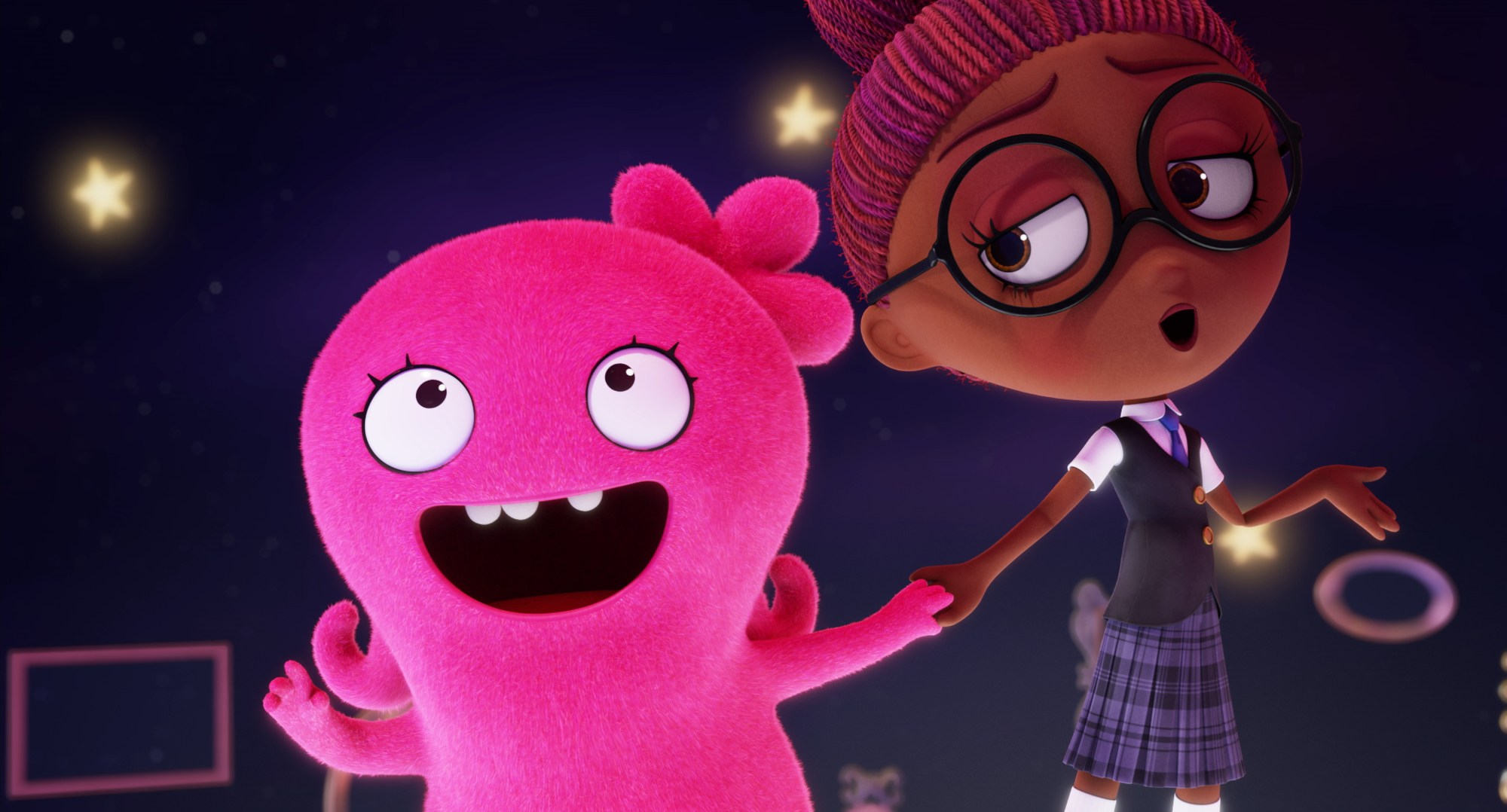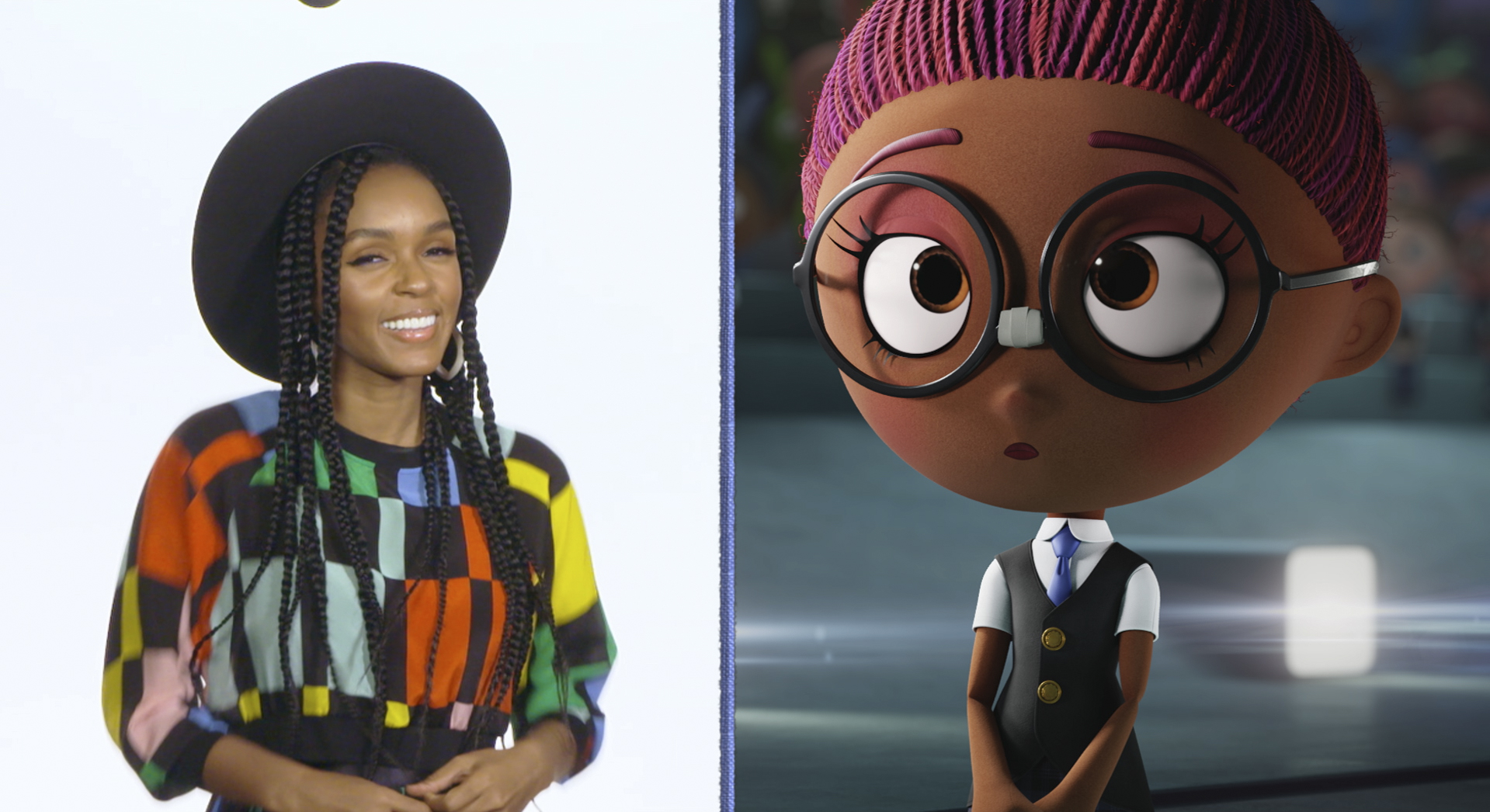Janelle Monáe’s role in an animated movie about dolls might seem unexpected, but much like the Grammy-nominated artist and actor’s previous work, the colorful new film is all about self-acceptance.
UglyDolls is about confronting what it means to be different, the desire to love, and the discovery that being true to who you are is the best thing that you can do.
Monáe joins the movie’s cast of popstar polymaths including Kelly Clarkson, Bebe Rexha, Charli XCX, and Lizzo in her role of Mandy, a sidelined mean girl in a place literally called Perfection. She’s been trying to conform to the impossible standards they uphold and conceal her imperfections, but as she comes to know Clarkson’s character Moxy and the other dolls from Uglyville, she realizes that it’s better to embrace your flaws and work with what you’ve got. The metaphors are deliberately obvious for the kids, but older viewers will also appreciate the cute reminder that beauty isn’t skin-deep.
“I think the message of embracing the things that make you unique – even if it makes others uncomfortable – is a powerful one, and I hadn’t necessarily seen it in animation growing up,” Monáe says on the phone from Los Angeles, a few days after twerking with Lizzo onstage at Coachella. “If I can be in a film that will help kids who are getting bullied every single day, then I have to say yes.”

Monáe has made self-love her mantra throughout her career, from her breakout 2010 single “Tightrope,” which preaches keeping a positive attitude despite haters, to 2018’s Dirty Computer, which was released as both audio and as a visual album, and explores the concept of rewriting the toxic programming that society codes us with.
On a particularly feisty song on that iconic body of work, “Django Jane,” Monáe hits back at the criticism she often received for her tomboyish appearance in her “Tightrope” days, which saw her wear a tuxedo and a pompadour. “Remember when they used to say I looked too man-ish?” she spits in the extended monologue. She then riffs on the power she always held, that wasn’t easily swallowed by the masses: “Black girl magic, y’all can’t stand it.”
Elsewhere on the album she shared touching stories of self-love in the face of childhood bullying, via the album’s fourth single, “I Like That.” “I remember when you laughed when I cut my perm off/ and you rated me a six/ I was like, ‘Damn’/ But even back then with the tears in my eyes/ I always knew I was the shit.” Those lines, excruciating in their honesty, make a lot of sense as a precursor to her part in UglyDolls.
Monáe says she saw herself in Mandy, who also grapples with peer pressure. “I loved portraying Mandy, who is so adorable. She represents a person who will protect marginalized voices and those who are considered the weirdos, the outcasts,” she says.
“I love the fact that all the UglyDolls and Mandy stand up to an abuser of power. I look at myself as a protector. I know people don’t need me necessarily, but I just can’t sit back and idly watch people who can’t stand up for themselves or feel the courage to do that. I can’t watch them be bullied. I have to say something, I have to do something — through music, through action — and I think this movie does just that. It gives a lot of hope and inspiration to kids, and not just kids, but adults too, who are constantly told if they don’t fit in they’re not good enough.”

Her message of self-acceptance and empowerment was made even stronger last year, when she came out as pansexual in a cover story with Rolling Stone. “I think sexual identity and fluidity is all a journey, it’s not a destination,” she says. “And as I go on this journey through life, and life takes you through so many different ways, it has opened me up, it’s opened up a whole new world as I create art. I always want to be honest to where I am at the time, and Dirty Computer, my latest album, is just a reflection of where I am. I don’t know how to create other than just being honest and starting inward, and then working outward. When you start inward, the universe opens up to you.”
She admits that publicly taking ownership of your identity, whether that’s through owning your sexuality or learning to love your body, doesn’t suddenly make you indestructible. “I think we all deal with having to make a choice daily to be confident. I don’t wake up every morning just confident and like I can conquer the world, you know? It’s a choice. And some days are better than others. Some days you don’t have the confidence. But that’s why movies like UglyDolls and albums that deal with motivation in the face of opposition can become a part of your lifestyle and give you the self-confidence that you couldn’t give yourself, you know? They can help boost it up. Because it’s all in us, we just need art to bring it out, and stories where we see ourselves reflected.”
Monáe has been steadily participating in films that tell powerful stories, from her role in Harriet, a forthcoming film about freedom fighter Harriet Tubman, to playing the part of Dorothy Pitman Hughes in The Glorias: A Life on the Road, based on feminist icon Gloria Steinem’s memoir. Her ever-growing list of inspiring roles could be an indication that Hollywood is coming into a more positive, productive time, but Monáe says it’s just the beginning.
“I think we can do better. I think we should bring more systemically marginalized voices to the table in the beginning, when we’re considering what films will be made and what stories will be told. I think it’s important to give those voices a seat at the table early on. And I see it happening, but we can’t get lazy. We can’t think that being passive will get us there. We have to be proactive, and the folks in the positions of power are going to have to really focus and highlight the voices that are usually not represented on screen.”
Fortunately we have Monáe, who is consistently living by example and empowering herself and audiences with every role she takes on.
UglyDolls is in theaters now
